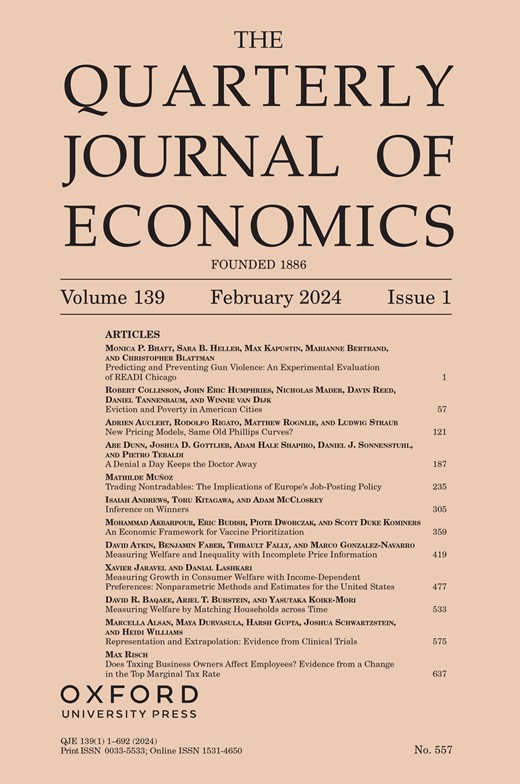收购如何影响企业行为和绩效:来自透析行业的证据*
IF 12.7
1区 经济学
Q1 ECONOMICS
引用次数: 22
摘要
许多行业通过并购变得越来越集中,在医疗保健领域,并购可能会对支出和结果产生重要影响。利用近100万透析患者的丰富医疗保险索赔数据,我们通过研究供应商在收购后改变行为的确切方式,推进了关于并购影响的文献。我们的实证分析基于大型连锁店在12年内对1200多家独立透析设施的收购,发现连锁店将几个突出的战略转移到了他们收购的设施上。最值得注意的是,收购的设施通过增加患者的™ 剂量的高报销药物,用技术水平较低的技术人员取代高技能护士,等待肾移植的患者减少。然后,我们发现,由于这些变化,患者的情况更糟:住院和死亡率等结果恶化,我们的长小组使我们能够从机构内部或患者内部的采集变化中识别这些影响。由于收购设施的总体医疗保险支出增加,主要是由于药品报销增加,因此这种质量的下降与支付者的价值下降相对应。我们通过考虑收购对供应商行为和结果产生如此大变化的渠道来总结这篇文章,发现市场力量的增加并不能解释质量的下降。相反,收购公司™s的战略和实践推动了我们的主要成果,药品采购的规模经济占收购后利润变化的一半以上。本文章由计算机程序翻译,如有差异,请以英文原文为准。
How Acquisitions Affect Firm Behavior and Performance: Evidence from the Dialysis Industry*
Many industries have become increasingly concentrated through mergers and acquisitions, which in health care may have important consequences for spending and outcomes. Using a rich panel of Medicare claims data for nearly one million dialysis patients, we advance the literature on the effects of mergers and acquisitions by studying the precise ways providers change their behavior following an acquisition. We base our empirical analysis on more than 1,200 acquisitions of independent dialysis facilities by large chains over a 12-year period and find that chains transfer several prominent strategies to the facilities they acquire. Most notably, acquired facilities converge to the behavior of their new parent companies by increasing patients’ doses of highly reimbursed drugs, replacing high-skill nurses with less-skilled technicians, and waitlisting fewer patients for kidney transplants. We then show that patients fare worse as a result of these changes: outcomes such as hospitalizations and mortality deteriorate, with our long panel allowing us to identify these effects from within-facility or within-patient variation around the acquisitions. Because overall Medicare spending increases at acquired facilities, mostly as a result of higher drug reimbursements, this decline in quality corresponds to a decline in value for payers. We conclude the article by considering the channels through which acquisitions produce such large changes in provider behavior and outcomes, finding that increased market power cannot explain the decline in quality. Rather, the adoption of the acquiring firm’s strategies and practices drives our main results, with greater economies of scale for drug purchasing responsible for more than half of the change in profits following an acquisition.
求助全文
通过发布文献求助,成功后即可免费获取论文全文。
去求助
来源期刊

Quarterly Journal of Economics
ECONOMICS-
CiteScore
24.20
自引率
2.20%
发文量
42
期刊介绍:
The Quarterly Journal of Economics stands as the oldest professional journal of economics in the English language. Published under the editorial guidance of Harvard University's Department of Economics, it comprehensively covers all aspects of the field. Esteemed by professional and academic economists as well as students worldwide, QJE holds unparalleled value in the economic discourse.
 求助内容:
求助内容: 应助结果提醒方式:
应助结果提醒方式:


